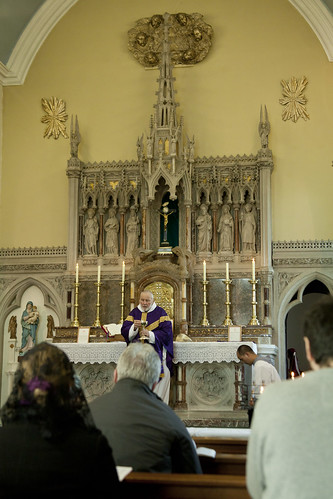 |
| Low Mass at the convent chapel of Lanherne |
Having cleared the ground of the idea that Traditional Catholics are disloyal, I am going to do a short series on the relationship between the Traditional Catholic movement and Orthodoxy.
There are people who like the Extraordinary Form, but have heterodox theological views. There are, of course, many people who are orthodox in faith who don't even know about the Traditional Mass, or know about it but don't particularly seek it out. It is nevertheless an observable phenomenon that Traditional Catholics tend to very orthodox, and, conversely, that heterodox thinkers within the Church tend to dislike the Traditional Mass. Indeed, Cardinal Ratzinger commented on the latter fact, linking hatred of the Vetus Ordo to dissent specifically about the sacrificial nature of the Mass.
I want to mention two reasons for this linkage, and one important consequence of it.
The first reason is, as with Cardinal Ratzinger's example, the texts of the Extraordinary Form emphasise a lot of the teachings which the most popular heresies of our day reject. This has now been set out at scholarly length by Lauren Pristas: if you don't want to believe this, buy her book about the reform of the Collects. The old collects, many of them being very old indeed, make repeated and very clear points about our need for grace, for example. The Holy Father is absolutely right to worry about Pelagianism in the Church - Cardinal Ratzinger, again, remarked that the texts of the Novus Ordo were open to Pelagian intepretation. But there are many such issues, the Real Presence, the reality of the Devil (another favourite topic of Pope Francis), even the theology of marriage (in the Nuptial Blessing), and the importance of penance and the intercession of the Saints.
The second reason is that the Traditional Mass represents continuity. It is is logically possible to accept the validity of the ancient Mass and reject the validity of the ancient teaching of the Church, or to reject the Mass and accept the teaching, but unless you have some strange and complicated reason to do either thing it is incongruous.
So here's the consequence. Liberals tend not only to dislike the Traditional Mass personally, but oppose anyone having access to it. This is something which is puzzling, but there is an explanation. They find the texts about grace and penance and the intercession of the saints embarrassing, not only for themselves but for the whole Church. They want them wiped from the Church's collective memory. But more deeply, they want to deny the continuity of the Church. They are opposed to the idea that anything worthwhile can be found in the Church's past. If they do look at the past, they prefer to look at isolated bits and pieces from the distant past, with which there is no lived continuity.
The reason is that in order to deny the Church's teaching you have to stop people appealing to the teaching and also to the lived experience of Catholics over recent centuries up to Vatican II. The recent centuries are the most useful, often, because they were struggling with the same problems as us: 'natural' theories of education, the theory of evolution, critical methods of interpreting the Bible, contraception, divorce, secularism. The liberals want to cut us off most of all from those parts of the Magisterium which are most useful. They want to destroy the prestige and authority of this teaching by ridiculing the Mass which went with it.
To be continued.
I think this is germane:
ReplyDeletehttp://www.youtube.com/watch?v=Oel1k7q0obY
Brilliant and poignant analysis, as always!
ReplyDeleteJust found this blog. Good stuff. Will get a bookmark.
ReplyDeleteUh, no. Pope-bashing is practically a sport when it comes to "Traditional Catholics." It's a popular pastime. They teach it to their children. I know this from personal experience, of almost 30 years attending exclusively "Traditional" churches. Also, they aren't Orthodox, or truly Traditional at all, since without obedience to the hierarchical Church, there is no Tradition or Orthodoxy.
ReplyDelete